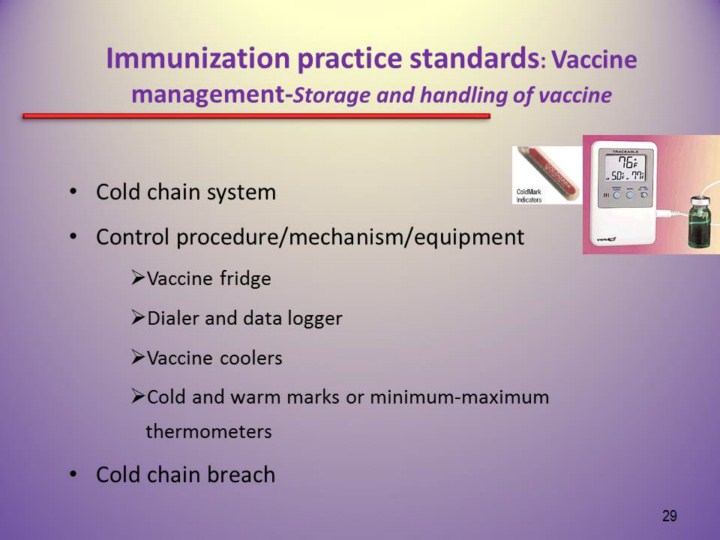Search for most updated materials
 |
 |
front |1 |2 |3 |4 |5 |6 |7 |8 |9 |10 |11 |12 |13 |14 |15 |16 |17 |18 |19 |20 |21 |22 |23 |24 |25 |26 |27 |28 |29 |30 |31 |32 |33 |34 |35 |36 |37 |38 |39 |40 |41 |42 |43 |44 |review |
 Reference : NB Immunization Handbook, section IV-IV Objectives of cold chain - Ensure vaccine safety Ensures vaccines maintain their immunogenic properties Keep temperature of fridge or PH approved cooler during transportation of vaccine between (2 to 8 °C) Cold chain process starts in manufacture and ends when vaccine is administered Vaccine fridge : Keep temperature between 2 and 8 °C Kept refrigerator between 2 to 8 °C Not to be used to store food or beverage Contain bottles of H20 to help maintain temperature Vaccines are not to be stored inside the the door Post procedure to follow in the event of a fridge failure Data Logger : device to monitor temperature and alert staff Vaccine cooler: Keep temperature between 2 and 8 °C Warm and cold (between Nov 1 and April 30) monitors are to be used in vaccine coolers while transporting vaccine One vaccine cooler at each clinic set-up Do not place vaccine directly on ice When traveling, protect cooler from sunlight Do not keep cooler in car trunk more than needed Check monitors when arriving on-site, regularly during the day and before storage at end of day Cold Chain Breach : Inform clinic coordinator Store affected vaccines in an approved cooler or in fridge Consult appropriate manufacturer about future use of the affected vaccine Identify vaccines by an “X” or destroy, according to consultation with manufacture Vaccine to be destroyed are returned to Serum Depot Complete “Report of Destroyed Vaccines” and include with the vaccine returned to Serum Depot
|
|